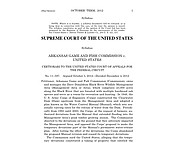WASHINGTON — The Supreme Court ruled Tuesday that the federal government is not automatically exempt from paying for damage caused by temporary flooding from government-owned dams.
In an 8-0 decision, the court sided with the Arkansas Game and Fish Commission in its appeal of a lower court ruling that said the federal government did not have to pay for damage to thousands of trees after the U.S. Army Corps of Engineers released more water than usual from its dam on the Black River. The release of additional water benefited farmers, but the commission said its hardwood forest suffered significant damage.
The commission said the damage amounted to the government taking its property, for which compensation would be owed under the Constitution.
The Court of Federal Claims agreed and ordered the government to pay $5.6 million for destroyed and damaged trees.
But the U.S. Court of Appeals for the Federal Circuit in Washington said damage resulting from temporary, as opposed to permanent or inevitable, flooding cannot be compensated under the Constitution’s Takings Clause.
Justice Ruth Bader Ginsburg, writing for the court, said the appeals court was mistaken. Ginsburg said that “government-induced flooding of limited duration, but severe impact, can amount to a taking of property warranting just compensation.”
But Ginsburg also cautioned that the court was not deciding that the government has to pay for all flooding caused by government action, or even necessarily in this case. Instead, courts must consider the details on a case-by-case basis.
The justices also ordered the appeals court to consider other arguments advanced by the government to avoid liability.
Justice Elena Kagan sat out the case because she worked on it while serving in the Justice Department.
The case is Arkansas Game and Fish Commission v. U.S., 11-597.
